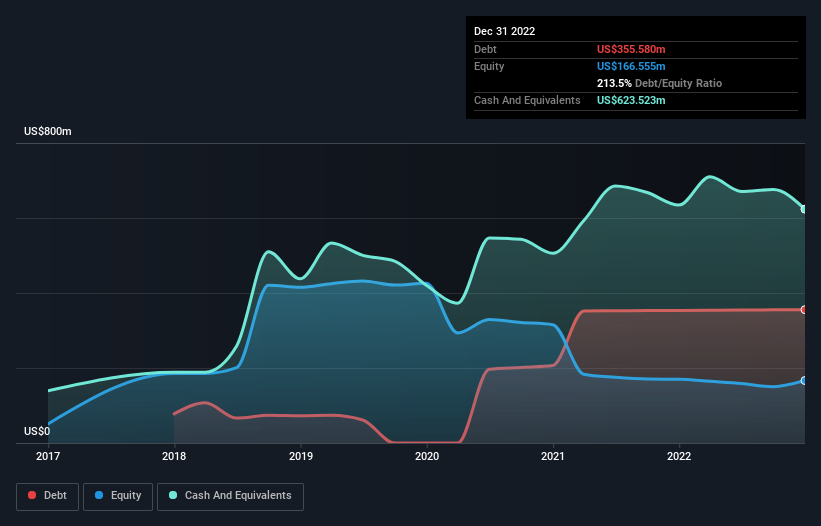
Howard Marks put it nicely when he said that, rather than worrying about share price volatility, 'The possibility of permanent loss is the risk I worry about... and every practical investor I know worries about.' So it might be obvious that you need to consider debt, when you think about how risky any given stock is, because too much debt can sink a company. As with many other companies Eventbrite, Inc. (NYSE:EB) makes use of debt. But is this debt a concern to shareholders?
Why Does Debt Bring Risk?
Debt assists a business until the business has trouble paying it off, either with new capital or with free cash flow. Ultimately, if the company can't fulfill its legal obligations to repay debt, shareholders could walk away with nothing. While that is not too common, we often do see indebted companies permanently diluting shareholders because lenders force them to raise capital at a distressed price. Having said that, the most common situation is where a company manages its debt reasonably well - and to its own advantage. When we think about a company's use of debt, we first look at cash and debt together.
See our latest analysis for Eventbrite
What Is Eventbrite's Net Debt?
The chart below, which you can click on for greater detail, shows that Eventbrite had US$355.6m in debt in December 2022; about the same as the year before. But on the other hand it also has US$623.5m in cash, leading to a US$267.9m net cash position.

How Strong Is Eventbrite's Balance Sheet?
We can see from the most recent balance sheet that Eventbrite had liabilities of US$361.0m falling due within a year, and liabilities of US$367.8m due beyond that. On the other hand, it had cash of US$623.5m and US$3.63m worth of receivables due within a year. So its liabilities total US$101.7m more than the combination of its cash and short-term receivables.
Of course, Eventbrite has a market capitalization of US$856.4m, so these liabilities are probably manageable. But there are sufficient liabilities that we would certainly recommend shareholders continue to monitor the balance sheet, going forward. Despite its noteworthy liabilities, Eventbrite boasts net cash, so it's fair to say it does not have a heavy debt load! There's no doubt that we learn most about debt from the balance sheet. But ultimately the future profitability of the business will decide if Eventbrite can strengthen its balance sheet over time. So if you're focused on the future you can check out this free report showing analyst profit forecasts.
In the last year Eventbrite wasn't profitable at an EBIT level, but managed to grow its revenue by 39%, to US$261m. With any luck the company will be able to grow its way to profitability.
So How Risky Is Eventbrite?
While Eventbrite lost money on an earnings before interest and tax (EBIT) level, it actually generated positive free cash flow US$4.2m. So taking that on face value, and considering the net cash situation, we don't think that the stock is too risky in the near term. The good news for Eventbrite shareholders is that its revenue growth is strong, making it easier to raise capital if need be. But we still think it's somewhat risky. The balance sheet is clearly the area to focus on when you are analysing debt. But ultimately, every company can contain risks that exist outside of the balance sheet. We've identified 1 warning sign with Eventbrite , and understanding them should be part of your investment process.
If you're interested in investing in businesses that can grow profits without the burden of debt, then check out this free list of growing businesses that have net cash on the balance sheet.
Valuation is complex, but we're here to simplify it.
Discover if Eventbrite might be undervalued or overvalued with our detailed analysis, featuring fair value estimates, potential risks, dividends, insider trades, and its financial condition.
Access Free AnalysisHave feedback on this article? Concerned about the content? Get in touch with us directly. Alternatively, email editorial-team (at) simplywallst.com.
This article by Simply Wall St is general in nature. We provide commentary based on historical data and analyst forecasts only using an unbiased methodology and our articles are not intended to be financial advice. It does not constitute a recommendation to buy or sell any stock, and does not take account of your objectives, or your financial situation. We aim to bring you long-term focused analysis driven by fundamental data. Note that our analysis may not factor in the latest price-sensitive company announcements or qualitative material. Simply Wall St has no position in any stocks mentioned.
About NYSE:EB
Eventbrite
Operates a two-sided marketplace that provides self-service ticketing and marketing tools for event creators in the United States and internationally.
Undervalued with adequate balance sheet.

